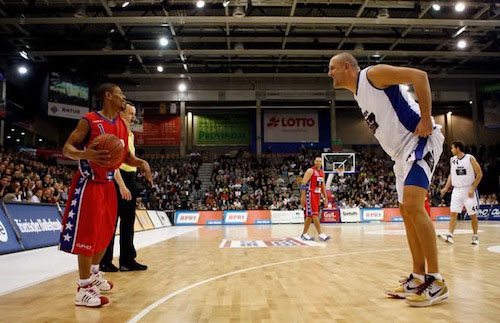It’s often perceived that a person of tall stature is built for basketball but is there truth to the stereotype or is it simply a phrase uttered by lazy people that don’t follow or understand the sport?
Here we take a look to answer the question ‘does height matter to succeed in the NBA?’
What is the average height of a NBA player?
Before we delve into whether or not height matters when it comes to succeeding in the NBA we want to take a look at the profiles of those players currently in the league. Now, for context, the average American adult male stands 5’9.
When you focus on the NBA that average height jumps up quite considerably to 6’6; that’s a hike of circa nine inches. With such a size advantage you’d have to make the assumption that height does matter to succeed in the NBA; it’s far from the only factor to consider when spotting basketball talent though.
What height ranges exist in the NBA?
To prove our point that mixing it up with the elite is not all about how tall someone is we take a gentle walk down memory lane to look back at the tallest and smallest players in NBA history.
Romanian Gheorghe Muresan is the tallest man to play in the league at a gigantic 7’7 but, whilst he had a decent enough career, he’s hardly a legendary figure because of his impact on the court.
In fact, Muggsy Bogues, who at 5’3 is the shortest player of all time, spent much longer at the top level than Muresan.
The height difference referenced there is obviously extreme but similar match ups still occur today. Tacko Fall, who was one of the best defensive players in the system during his college days, is the tallest player in the league at the moment; he stands at 7’5.
Isiah Thomas is the shortest in the NBA at 5’10. It’s true that the difference isn’t quite Muresan versus Bogues but 7’5 to 5’10 is still pretty big swing and acts as further proof that it’s not all about size.
You can find a very detailed list of the shortest players in NBA history here: edge.twinspires.com/nba/the-shortest-players-in-nba-history/
Does height dictate the position a player can play?
In terms of the rule book any player can play in any position; you could play a 5’0 player as a center and a 8’0 player at point guard but you probably wouldn’t! The facts of the matter are that the positions do vary quite wildly in terms of the average height of players.
Based on recent seasons, point guards and shooting guards come in around the 6’3 to 6’4 mark, which is on the lower end of the height spectrum. Small forwards come in an inch or two taller with power forwards a little taller again. Finally, you have the centres who push towards the 7’0 mark as an average height.
How important is ability?
People who truly follow basketball will know that physical attributes are just part of the battle to making it as a basketball player in the NBA. The previously mentioned Fall is a good example of that. The UCF graduate probably wouldn’t have got his chance in Boston had he stood at 6’5 rather than 7’5.
His larger than average frame earned him his spot on a NBA roster but his ability to effectively do the job of a center means he’s spent a lot of his time in the G League.
Back on the topic of players in general, ability will always trump physicality on a basketball court. A player of 7’0 should be good at protecting the rim but they need to have the ability to read the play and time their jumps. Without that, their height is useless.
That applies to those shorter players too; it’s no good having the pace and agility to steal possession if you can’t dribble, pass or shoot at the end.
So, to summarise, does height matter to success in the NBA? It can help, but it’s far from the full ticket to the top.

“Hardcore beer fanatic. Falls down a lot. Professional coffee fan. Music ninja.”






More Stories
US energy production hits new record
Rugby: Former Australia captain Michael Hooper has ended his career after his dream of competing in the Olympics evaporated.
Despite its lack of discipline, Australia prevailed against Georgia